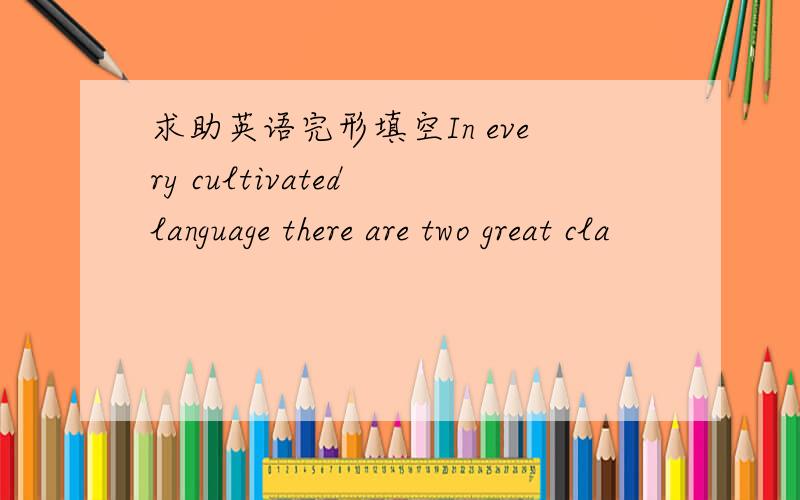求助英语完形填空In every cultivated language there are two great cla
来源:学生作业帮 编辑:神马作文网作业帮 分类:英语作业 时间:2024/11/13 00:19:52
求助英语完形填空
In every cultivated language there are two great classes of words,which makes up the whole vocabulary.First,there are those words _56__ which we become familiar in daily conversation,which we _57__,that is to say,from the _58__ of our own family and from our friends,and __59_ we should know and use _60__ we could not read or write.They _61__ the common things of life with all the people who __62_ the language.Such words may be called "popular",since they belong to the people _63__ and are not excluded __64_ a limited class.
On the other hand,our language _65__ a large number of words which are comparatively _66__ used in ordinary conversation.Their meanings are known to every educated person,but there is little _67__ to use them at home or in the market-place.Our _68__ acquaintance (熟悉) with them comes not from our mother's _69__ or from the talk of our schoolmates,70___ from books that we read,lectures that we _71__,or the more _72__ conversation of highly educated speakers who are discussing some particular _73__ in a style properly higher above the habitual _74__ of everyday life.Such words are called "learned",and the _75__ between them and the "popular" words is of great importance to a right understanding of language study process.
56.A.at B.with C.by D.through
57.A.study B.imitate C.stimulate D.learn
58.A.mates B.relatives C.members D.fellows
59.A.which B.that C.those D.ones
60.A.even B.despite C.even if D.in spite of
61.A.mind B.concern C.care D.relate
62.A.hire B.apply C.adopt D.use
63.A.in public B.at most C.at large D.at best
64.A.in B.from C.with D.on
65.A.consists B.consists of C.makes D.composes
66.A.seldom B.much C.greatly D.often
67.A.possibility B.way C.reason D.necessity
68.A.primary B.first C.principal D.prior
69.A.tips B.mouth C.ears D.tongue
70.A.besides B.and C.yet D.but
71.A.hear of B.attend C.hear from D.listen
72.A.former B.formula C.formal D.forward
73.A.theme B.topic C.idea D.point
74.A.border B.link C.degree D.extent
75.A.relation B.distinction C.connection D.similarity
In every cultivated language there are two great classes of words,which makes up the whole vocabulary.First,there are those words _56__ which we become familiar in daily conversation,which we _57__,that is to say,from the _58__ of our own family and from our friends,and __59_ we should know and use _60__ we could not read or write.They _61__ the common things of life with all the people who __62_ the language.Such words may be called "popular",since they belong to the people _63__ and are not excluded __64_ a limited class.
On the other hand,our language _65__ a large number of words which are comparatively _66__ used in ordinary conversation.Their meanings are known to every educated person,but there is little _67__ to use them at home or in the market-place.Our _68__ acquaintance (熟悉) with them comes not from our mother's _69__ or from the talk of our schoolmates,70___ from books that we read,lectures that we _71__,or the more _72__ conversation of highly educated speakers who are discussing some particular _73__ in a style properly higher above the habitual _74__ of everyday life.Such words are called "learned",and the _75__ between them and the "popular" words is of great importance to a right understanding of language study process.
56.A.at B.with C.by D.through
57.A.study B.imitate C.stimulate D.learn
58.A.mates B.relatives C.members D.fellows
59.A.which B.that C.those D.ones
60.A.even B.despite C.even if D.in spite of
61.A.mind B.concern C.care D.relate
62.A.hire B.apply C.adopt D.use
63.A.in public B.at most C.at large D.at best
64.A.in B.from C.with D.on
65.A.consists B.consists of C.makes D.composes
66.A.seldom B.much C.greatly D.often
67.A.possibility B.way C.reason D.necessity
68.A.primary B.first C.principal D.prior
69.A.tips B.mouth C.ears D.tongue
70.A.besides B.and C.yet D.but
71.A.hear of B.attend C.hear from D.listen
72.A.former B.formula C.formal D.forward
73.A.theme B.topic C.idea D.point
74.A.border B.link C.degree D.extent
75.A.relation B.distinction C.connection D.similarity

BDCAC BDCCB ADBDD BCBDB
56.「答案」B
[解析」本句中由with which引导的定语从句,修饰先行词those words.短语become acquainted with sb./sth.意为“认识某人,了解某事.”
57.「答案」D
「解析」imitate意为“模仿”,stimulate意为“刺激,激发”.study和learn都有“学习”的意思,study着重研究,而learn指一般性的学习,故选D.
58.「答案」C
「解析」mate意为“伙伴,同事”,可组成复合名词,如:classmate同学,roommate同房间的人.relative意为“亲戚”,member意为“成员”,family member意为“家庭成员”,fellow意为“伙伴,家伙”.
59.「答案」A
「解析」which引导非限制性定语从句,和前面的定语从句并列,修饰先行词those words,关系代词that只能在限制性定语从句中代替which.
60.「答案」C
「解析」even if在这里引导条件状语从句.Even是副词,不能引导状语从句.In spite of和despite表示“尽管”,为介词词组或介词,也不能引导状语从句.
61.「答案」B
「解析」本句的意思是“它们涉及生活中的一般性事情,是所有使用这种语言的人惯用的语言材料.Concern意为”涉及“,mind和care表示”介意,计较“,relate表示”讲述、叙述“.
62.「答案」D
「解析」use意为“使用”,apply意为“运用”,hire意为“雇用”,adopt意为“采纳”.
63.「答案」C
「解析」at large意为“普遍的、一般的”,in public意为“公开地、当众”,at most意为“至多、不超过”,at best意为“充其量、至多”.
64.「答案」C
「解析」share意为“份额、共享”.right和privilege意为“权利、特权”,在本句不符合题意.possession意为“拥有、占有”,通常指拥有财物.
65.「答案」B
「解析」compose常用于被动结构be composed of表示“由……组成”.consist是不及物动词,必须和of组成短语动词表示“由……组成”,constitute意为“构成”.
66.「答案」A
「解析」seldom意为“不经常、很少”.
67.「答案」D
「解析」possibility意为“可能”;way“方式”;reason“理由”;necessity“必要性”.本句只有necessity符合句意.
68.「答案」B
「解析」本句意为“我们最初既不是从母亲嘴里,也不是从同学那里了解这些单词的……”first“第一、首先”;primary“基本的、原始的”;prior“优先的、在先的”;principal“主要的、首要的”.
69.「答案」D
「解析」learn sth from one‘s lips是固定搭配,表示“从某人嘴里得知”.这里没有,不知道tongue表示母语可不可以(不很确定)
70.「答案」D
「解析」与前面的not连接,not...but...表示“不是什么而是什么”.
71.「答案」B
「解析」attend a lecture“参加一个讲座”.
72.「答案」C
「解析」formal“正式的”;former“以前的”;formula“公式、方程”;forward“向前的”.
73.「答案」B
「解析」topic“话题”;theme“主题”;point“要点”;idea"主意".本句指讨论的话题,故选topic.
74.「答案」D
「解析」degree和extent均可表示程度,但extent还可表示“范围”.本句意为:……讨论问题的方式超越了日常生活的范围,所以选extent.Border边界,link连接.
75.「答案」B
「解析」relation“关系”;distinction“差别”;connection“连接、关系”;similary“相似之处”.本句意为:学术性词语和大众化词语之间的差别,故选distinction.
56.「答案」B
[解析」本句中由with which引导的定语从句,修饰先行词those words.短语become acquainted with sb./sth.意为“认识某人,了解某事.”
57.「答案」D
「解析」imitate意为“模仿”,stimulate意为“刺激,激发”.study和learn都有“学习”的意思,study着重研究,而learn指一般性的学习,故选D.
58.「答案」C
「解析」mate意为“伙伴,同事”,可组成复合名词,如:classmate同学,roommate同房间的人.relative意为“亲戚”,member意为“成员”,family member意为“家庭成员”,fellow意为“伙伴,家伙”.
59.「答案」A
「解析」which引导非限制性定语从句,和前面的定语从句并列,修饰先行词those words,关系代词that只能在限制性定语从句中代替which.
60.「答案」C
「解析」even if在这里引导条件状语从句.Even是副词,不能引导状语从句.In spite of和despite表示“尽管”,为介词词组或介词,也不能引导状语从句.
61.「答案」B
「解析」本句的意思是“它们涉及生活中的一般性事情,是所有使用这种语言的人惯用的语言材料.Concern意为”涉及“,mind和care表示”介意,计较“,relate表示”讲述、叙述“.
62.「答案」D
「解析」use意为“使用”,apply意为“运用”,hire意为“雇用”,adopt意为“采纳”.
63.「答案」C
「解析」at large意为“普遍的、一般的”,in public意为“公开地、当众”,at most意为“至多、不超过”,at best意为“充其量、至多”.
64.「答案」C
「解析」share意为“份额、共享”.right和privilege意为“权利、特权”,在本句不符合题意.possession意为“拥有、占有”,通常指拥有财物.
65.「答案」B
「解析」compose常用于被动结构be composed of表示“由……组成”.consist是不及物动词,必须和of组成短语动词表示“由……组成”,constitute意为“构成”.
66.「答案」A
「解析」seldom意为“不经常、很少”.
67.「答案」D
「解析」possibility意为“可能”;way“方式”;reason“理由”;necessity“必要性”.本句只有necessity符合句意.
68.「答案」B
「解析」本句意为“我们最初既不是从母亲嘴里,也不是从同学那里了解这些单词的……”first“第一、首先”;primary“基本的、原始的”;prior“优先的、在先的”;principal“主要的、首要的”.
69.「答案」D
「解析」learn sth from one‘s lips是固定搭配,表示“从某人嘴里得知”.这里没有,不知道tongue表示母语可不可以(不很确定)
70.「答案」D
「解析」与前面的not连接,not...but...表示“不是什么而是什么”.
71.「答案」B
「解析」attend a lecture“参加一个讲座”.
72.「答案」C
「解析」formal“正式的”;former“以前的”;formula“公式、方程”;forward“向前的”.
73.「答案」B
「解析」topic“话题”;theme“主题”;point“要点”;idea"主意".本句指讨论的话题,故选topic.
74.「答案」D
「解析」degree和extent均可表示程度,但extent还可表示“范围”.本句意为:……讨论问题的方式超越了日常生活的范围,所以选extent.Border边界,link连接.
75.「答案」B
「解析」relation“关系”;distinction“差别”;connection“连接、关系”;similary“相似之处”.本句意为:学术性词语和大众化词语之间的差别,故选distinction.
求助英语完形填空In every cultivated language there are two great cla
英语翻译 In every cultivated language there are two great classe
英语翻译in every cultivated language ,there are two great classe
完形填空.....In every language,there are words that have some in
in every language there are words that have some interesting
完形填空There are nineteen boys and twenty-eight girls 1 our cla
英语的完形填空There are two main kinds of sports
七年级英语短文填空,There are some rules in every family.Everyone ____
六年级英语填空题I live in a village.There are two high mountains nea
简单的英语填空There are two maps in our classroom.____ is a map of
英语填空题Fill in the spaces.There are two extra words.simple liv
英语阅读 完形填空There was a woman in Detroit, who had two sons. She